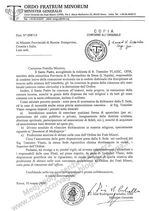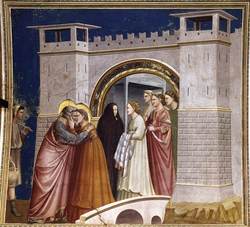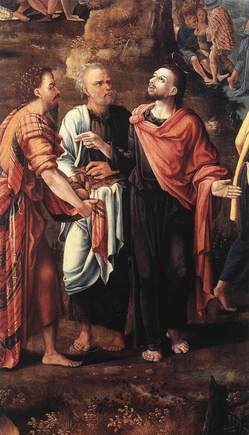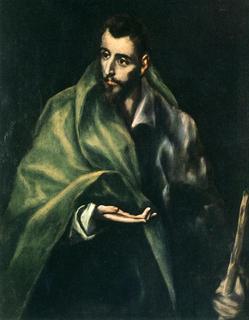 A CNA article today announces the priest who identified the alleged apparitions of the BVM is now leaving the priesthood and his religious order. The authorized his defrocking in March. Also disturbing are the reports that some of the seers are living in wealthy conditions, presumably derived from monies given by pilgrims. See the brief Mail Online article. The Telegraph tells more…
A CNA article today announces the priest who identified the alleged apparitions of the BVM is now leaving the priesthood and his religious order. The authorized his defrocking in March. Also disturbing are the reports that some of the seers are living in wealthy conditions, presumably derived from monies given by pilgrims. See the brief Mail Online article. The Telegraph tells more…
Capuchins reflect on their work in the Amazon
 The Capuchins in Italy are taking time to reflect on
The Capuchins in Italy are taking time to reflect on
the greatest God-given gift they’ve received: work of 100 years among the native Brasilian
peoples. What really struck me was the Provincial’s comment: “And we truly lived it as
a gift: participating in His mission, that is to say, the mission of Jesus
Christ.”
Business and Ignatian Spirituality
You won’t see me giving space to the “good work” of the Nat’l Catholic Reporter on this blog very often (almost never except for John Allen’s work) because of the NCRs frequent loyal opposition to the Church, but a recent article on the intersection of business and Ignatian Spirituality is worth noting. Read it here.
I highlight this article because I like the work of Jesuit Father Robert Spitzer, the president emeritus of Gonzaga University, Spokane, WA. Father Spitzer is a philosopher with significant grounding in faith and reason (science). He has hosted a few programs on EWTN that are very worthwhile.
Benedict reminds us to honor grandparents, & the elderly
I don’t think “grandparents day” in the Hallmark manner has hit the pope yet, but he did tell his listeners that grandparents are a central part of the family. The feast of Saints Joachim and Anne is the Church’s way of honoring grandparents seeing in Saints Joachim and Anne great models of what grandparents are to be for children and family systems. Pope Benedict’s remarks came within a reflection of the Sunday gospel where we heard Saint John’s narrative of the Multiplication of the loaves and fish. He asks THAT rather important question which we ask ourselves in front of Christ: who am I?
Saint John narrates the multiplication of the loaves and fishes and in doing so
introduces the notion of priestly mediation and the sacrament of the Eucharist.
He said “It is as if the Eucharist were anticipated in the great sign of
the bread of life. In this Year for Priests, … we members of the clergy may
see ourselves reflected in this text of John’s, identifying ourselves with the
Apostles when they say: where are we going to find bread for these people to
eat? And when we read of that anonymous boy with his five barley loaves and two
fish, we too are moved to exclaim: But what are they among so many people? In
other words, who am I? How can I with my limitations help Jesus in His mission?
And it is the Lord Who provides the answer: By putting in his ‘saintly and
venerable’ hands the little they are, priests become instruments of salvation
for many people, for everyone!”
our society, the Pope mentioned Saints Joachim and Anne, parents of the Blessed
Virgin Mary and, hence, grandparents of Jesus, whose feast day was yesterday (see the blog entry below).
Since yesterday was Sunday, the Church didn’t observe the liturgical memorial
of these two rather important saints because Sunday ordinarily trumps the feast of saints. Careful observers of Benedict’s work will notice that he comes back to a constant theme with the vital importance his places on education in Church’s pastoral care program. Benedict XVI invited us “to pray for grandparents who, in families, are the depositories
and often witnesses of the fundamental values of life.” The educational
role of grandparents is always important, and it becomes even more important
when, for various reasons, parents are unable to ensure an adequate presence
alongside their children as they are growing”, the Pope added, entrusting
all the grandparents of the world to the protection of Saints Joachim and Anna. He also mentioned “all elderly
people, especially those who are alone or experiencing moments of difficulty.”
Saints Joachim and Anne, Parents of Mary
Reclaiming the right focus with 5 loaves & 2 fish: being fed by the hand of God
Today the Church suspends her reading of Mark’s gospel for the next four weeks in favor of reading the famed narrative of the Bread of Life discourse of Jesus from the Gospel of John. Here the Church asks us to meditate on the life-giving food, the Eucharist, which Jesus gives to us as His supreme gift of love and life. Here the abundance of the sacred banquet is beginning to be known.
Saint James the Greater, Apostle
We beseech Thee, O Lord, keep and sanctify Thy people, that strengthened by the help of Thine Apostle James they may please Thee by their conduct and serve Thee with a quiet mind.
Prayers for those who really need them
Yesterday morning my mother called me with the startling news that a second cousin on my father’s side had died. Deborah was 42; because of a complicated family system I don’t recall meeting her. Deborah’s father is my father’s cousin and we would see him every now-and-again. Deborah’s death was kept a secret from family and friends; a proper Mass of Christian Burial with the prayerful solidarity of the family and friends is not happening. The ministrations of the Catholic Church were sidelined. The cross of addiction on which Deborah hung –which is known to many in this world– was quite heavy, probably too heavy, for Deborah and for her family to carry. I am presuming that Deborah’s death is and will continue to be for years to come an unfathomable puzzle –full of incredible pain and sorrow– for the family and friends who survive. My also think that God mourns the loss of His daughter.
Saint Sharbel Makhlouf
 Every one who has left houses or brothers or sisters or father or mother or children or lands, for my name’s sake, will receive a hundredfold, and inherit eternal life.
Every one who has left houses or brothers or sisters or father or mother or children or lands, for my name’s sake, will receive a hundredfold, and inherit eternal life.
God our Father in Saint Sharbel Makhluf, You gave a light to Your faithful people. You made him a pastor of the Church to feed Your sheep with his word and to teach them by his example. Help us by his prayers to keep the faith he taught and follow the way of life he showed us.
Saint Sharbel Makhlouf (1828-1898) was born in a small Lebanese mountain village who became, at 23 years old, a monk of the Lebanese Maronite Order and later ordained a priest in 1859. He is known for his intense devotion to lectio divina, the Eucharist and the Blessed Virgin Mary. Sensing a deeper call in 1875, he began a solitary life (as a hermit) which he lived for twenty-three years of his life. Sharbel’s witness taught us about the virtues of poverty, self-sacrifice, and prayer in world dominated by an attraction to money, power and fame. Since July 24, 2004 Saint Sharbel has been introduced the liturgical observance in the sacred Liturgy.
Archbishop Francis M. Zayek said of Saint Sharbel:
“Reading about the holy hermits of the desert, we used to consider many reported facts as mere fables. In the life of Blessed Sharbel, however, we notice that these facts are authentic and true. Blessed Sharbel is another Saint Anthony of the Desert, or Saint Pachomius, or Saint Paul the Anchorite. It is marvelous to observe how you, Maronites, have preserved the same spirituality of the fathers of the desert throughout the centuries, and at the end of the nineteenth century, 1500 years later, produced a Sharbel for the Church.”
(The icon was painted by iconographer Christine Habib el Dayé. Other pieces of the artist’s work can be seen here and she can also be found on Facebook.)
Recipe for a thriving religious order
 Recently, the National Catholic Register published an
Recently, the National Catholic Register published an
article on the life of nuns at the Valley of Our Lady Monastery, located on 112
acres in Prairie du Sac, outside of Madison, Wisconsin. The author brings out
some salient points that contribute to the “success” of this particular
monastery. Let’s be clear, success is not defined here in terms of secularity but ways that allow for a vocation to thrive according to the Divine
Plan. Let me draw your attention to two things that struck me. Mind you, these
items (see below) are not new at all but they do spell out what is needed to help contribute to
the resurgence of religious life if it’s God’s will. Sadly groups like the Sisters of Mercy, the Sisters of St Joseph, the various Franciscan and Dominican sisters’ congregations to name a few, would think these comments are inaccurate, too shrill and not relevant for the “modern world.” Truthfully, I think these groups want to die because they are too “relevant” matter. BUT when you see women attracted to congregations like this monastery, the Alma Mercy Sisters and the Franciscan Sisters of the Martyr Saint George and not to the secular-looking groups, then one has to ask the hard questions. Having defend the general thesis of the article, let it be known I am not totally in
agreement with Father Mullady’s acceptance of BlackBerries but I can’t have
everything.
ancient contemplative order, Sister Bernarda replied, “To begin with, God.” She
added, “Then, perhaps, the desire for a life of prayer, solitude, simplicity,
with an ancient liturgy in Latin and Gregorian chant, and a simple, traditional
habit. Also, we follow the directives of our order and the Church.” Sister Mary
Bede boiled it down to this: “When you’re looking for a traditional,
habit-wearing, Divine Office-saying order, it narrows down your choices a bit.”
She preferred the Cistercians to some of the newer orders, explaining,
“Definitely, it’s a comfort knowing that the Rule of St. Benedict has
sanctified hundreds of thousands of men and women throughout the ages. It helps
to live a life in faith — that God will work through our superiors and rule to
bring about our sanctification.” When asked what keeps her order so grounded in
its ancient origins and traditions, Sister Mary Dolores responded, “There is a
preservation of identity; progress comes not from something entirely new, but a
returning to the charism of the founders. In tradition, the past is present but
updated.”
survive the decades after Vatican II. Theological consultant for the Institute
on Religious Life in Libertyville, Ill. — a collaborative effort of Catholic
bishops, priests, religious and laity to foster and strengthen vocations to the
consecrated life — Father Mullady said: “Mostly they weathered the changes by
adapting the things that needed to be adapted for young people — there are
sisters on the Internet and carrying BlackBerries — but preserving the habit,
the cloister, silence, reading at table, living in community.”
the article.



